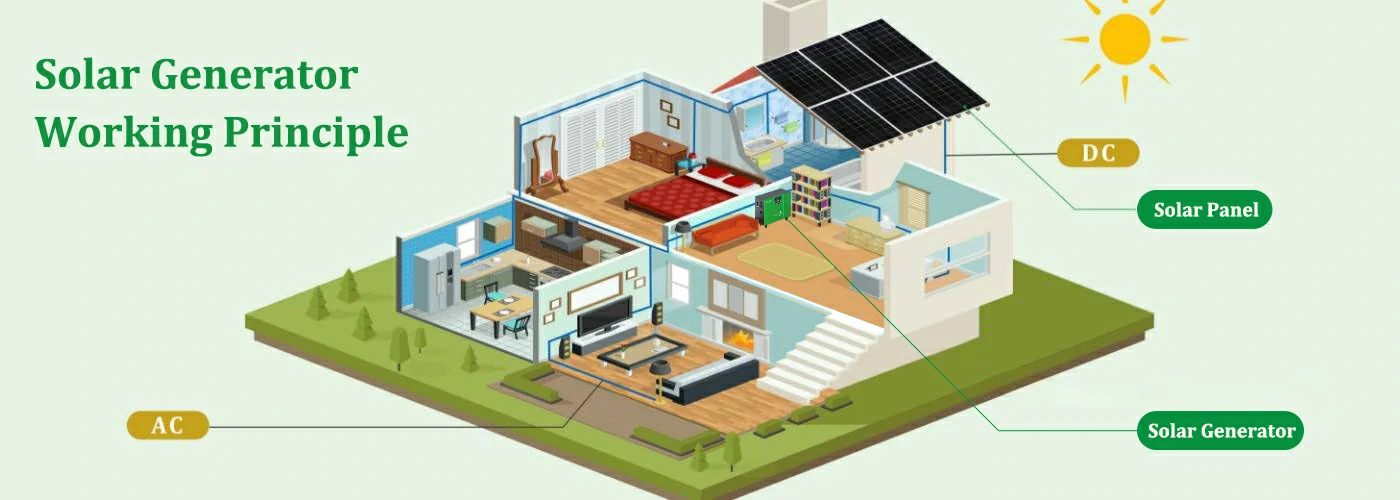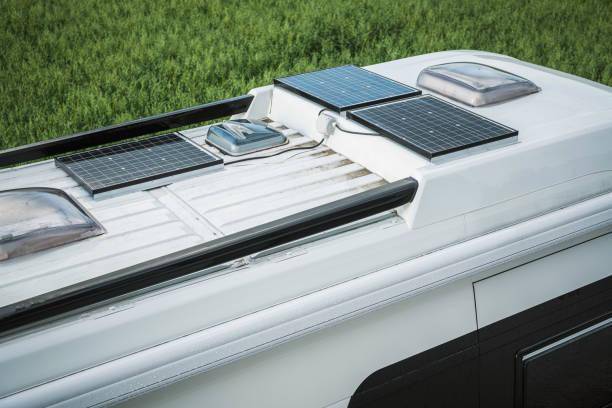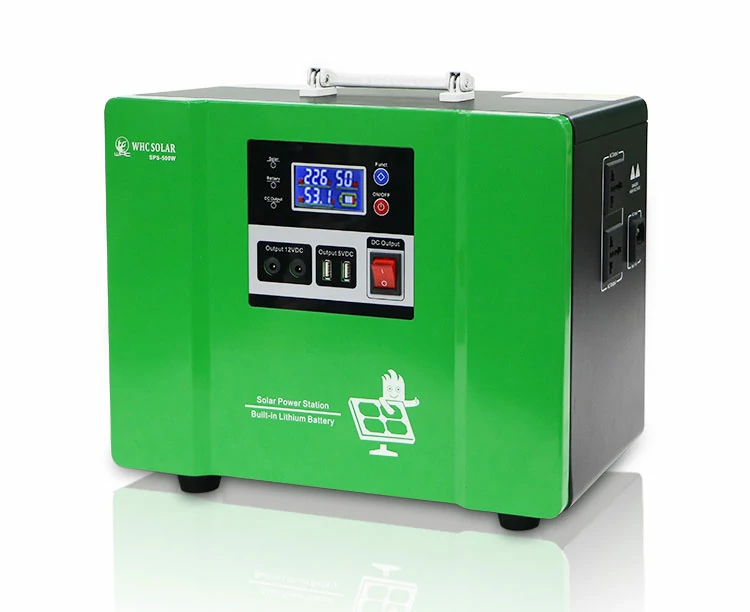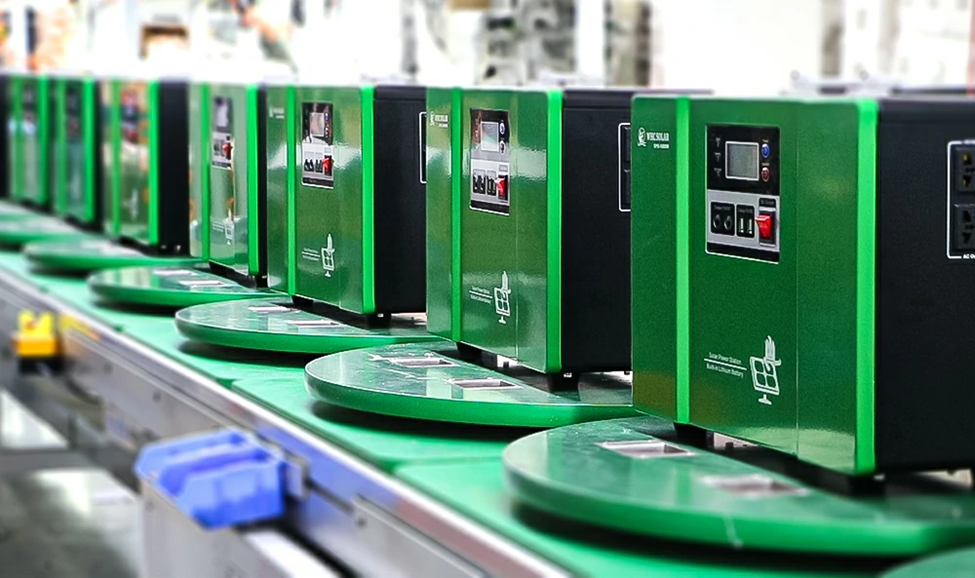Solar generators for RVs are becoming increasingly popular due to their portability, sustainability, and cost-effectiveness. They are a reliable source of power that can help RVers enjoy their adventures without worrying about access to traditional power sources.
In this article, we will discuss the solar generators for RVs by WHC SOLAR. In addition, we will cover everything you need to know about solar generators, including how they work, their benefits, and tips for choosing the best type of solar generator. We will also provide recommendations for some of the best solar generators for RV and offer tips for choosing the right one for your needs.
What Is a Solar Generator?

What is a solar generator? A solar generator is a portable power system that uses solar panels to convert sunlight into electricity, which is then stored in a battery. This stored energy can be used to power various devices and appliances, making it an ideal solution for off-grid and emergencies.
The four main components of a solar generator are solar panels, a charge controller, batteries, and an inverter.
Solar panel
They are responsible for collecting sunlight and converting it into direct current (DC) electricity. The amount of electricity generated depends on the size and efficiency of the solar panels.
Charge Controller
Solar charge controllers are responsible for controlling and managing the amount of charge stored in the batteries. Without this component, the battery could go bad from overcharging.
Batteries
They are used to store the electricity generated by solar panels. The type and capacity of the battery used will depend on the amount of energy needed and the duration of use. Lithium-ion batteries are commonly used due to their high energy density and longer lifespan.
Some of the leading solar generator suppliers will engineer a built-in LiFePO4 lithium battery to offer a portable solar generator solution. And the solar generators can be recharged by on-grid electricity, a solar panel, and a car cigarette lighter.
Inverter
An inverter is used to convert the DC electricity stored in the battery into alternating current (AC) electricity that can be used to power appliances and devices. The inverter’s capacity will depend on the amount of energy needed and the number of devices that need to be powered.
By utilizing these components, solar generators provide a reliable and sustainable source of power for a variety of applications.
Can a Solar Generator Power an RV?

Yes, a solar generator can power an RV. The amount of power required to run an RV depends on the capacity of the RV and the number of appliances and devices that need to be powered. A solar generator can be sized to match the specific power requirements of the RV.
To ensure that the solar generator is capable of powering the RV, it is important to carefully calculate the power needs of the RV and select a solar generator with sufficient capacity. Factors such as the number of solar panels, battery capacity, and inverter capacity must be considered to ensure that the solar generator can meet the power demands of the RV.
In addition to being a sustainable and environmentally friendly option, using a solar generator for RV can also provide greater flexibility and freedom when traveling, as it eliminates the need to rely on traditional power sources such as electrical hookups or generators that require fuel. In remote areas or areas where fuel is not readily available, solar generators can take the RV farther.
Advantages and Drawbacks of Solar Generators for RVs
As the popularity of RVs continues to grow, so does the demand for alternative energy sources. Solar generators are an excellent option for businesses that cater to the RV lifestyle, such as RV rental companies. Understanding some of the pros and cons of solar-powered portable generators can help you choose the right way to power what your need. Let’s take a closer look at the benefits and limitations of using a solar generator as a source of electricity.
Advantages
Renewable Energy Source
Solar generators are mainly powered by renewable energy sources, namely sun rays, making them an environmentally-friendly alternative to traditional generators. This makes them an attractive option for businesses and RV owners looking to reduce their carbon footprint and promote sustainability.
Low Maintenance
All-in-one solar generators have few moving parts, which means they require less maintenance than traditional generators. They also do not need oil changes or fuel filters, saving businesses money on maintenance costs, and making them a reliable and low-maintenance source of energy for RVs.
Noise-Free Operation
Traditional generators can be noisy, which can be a nuisance for campers and RVers. Solar generators, on the other hand, operate quietly, providing a peaceful and enjoyable camping experience. This feature is particularly attractive to RV rental companies, as it can help them stand out from competitors who use traditional generators.
Portability
One of the key advantages of solar generators is their portability. They are lightweight and easy to move, making them an ideal power source for RVs. Solar generators can be easily transported from one location to another, and they can be set up in a matter of minutes.
Scalability
Solar generators are highly scalable. This makes them an ideal option for RV rental companies and businesses that cater to RVers, as they can easily adapt to changes in demand. For example, solar generators from WHC SOLAR can be customized to different sizes, input voltage, output voltage, rated power, etc.
Cost Savings
While solar generators may have a higher upfront cost compared to traditional generators, they offer significant cost savings in the long run. They do not require fuel, which can save businesses money on operational costs.
Disadvantages
While solar generators offer numerous advantages to RV rental companies and businesses that cater to the RV lifestyle, there are also some disadvantages to consider.
Initial Cost
One of the biggest disadvantages of solar generators is the initial cost of investment. While they may offer cost savings in the long run, the upfront cost of purchasing and installing a solar generator can be high. This can be a significant barrier for businesses that may not have the financial resources to invest in solar technology.
Weather Dependence
Solar generators rely on sunlight to generate power, which means they are weather-dependent. In cloudy or rainy conditions, the power output of a solar generator can be significantly reduced. This can be a challenge for businesses that rely on consistent power output, especially in areas with unpredictable weather patterns. You can choose a reliable solar generator manufacturer like WHC, which supplies solar generators supporting solar charging, in addition, electricity supply charging and car charging.
Limited Power Capacity
Solar generators have a limited power capacity compared to traditional generators. While they are suitable for powering small appliances and electronics, they may not be able to provide sufficient power for larger appliances such as air conditioners, refrigerators, or microwaves. This can be a limitation for RV rental companies that offer larger RVs with more appliances.
Heavy Solar Panels
Solar panels can be heavy, which can be a challenge for businesses that want to make their RVs as lightweight and portable as possible. Additionally, the weight of the solar panels can make them difficult to install, which can add to the overall installation cost. To avoid this drawback, you can opt for all-in-one solar generators which do not require solar panel charging.
What Size of the Solar Generator Is Perfect for a Camper?
What size generator to run a camper? The size of the solar generator needed for a camper depends on the power requirements of the appliances and devices that need to be powered. To determine the appropriate size, users should first make a list of all the appliances and devices they plan to use and their power ratings in watts.
Once this list is compiled, users can estimate the total power required per day by adding up the individual power ratings and multiplying them by the number of hours they will be used. This total power requirement can then be used to determine the size of the solar generator needed.
For example, a solar powered generator for camper that needs to power a refrigerator, lights, and a phone charger may require a solar generator with a capacity of 100-200 watts. However, a camper that needs to power a microwave, air conditioner, and other high-powered appliances may require a much larger solar generator with a capacity of 1000 watts or more.
In summary, the size of the solar generator for camper depends on the power requirements of the appliances and devices that need to be powered, and users should carefully consider their power needs before selecting a solar generator.
Easy Tips for Choosing the Best Generator for an RV

Choosing the best generator for an RV is an important decision, as it can significantly impact the comfort and convenience of your camping experience. Knowing what end users consider when choosing a product will help you improve your product line and increase your success rate. Here are some tips to follow.
Portability/Weight
Portability and weight are critical factors to consider when selecting a generator for an RV. Look for a lightweight, compact, and easy-to-transport generator that won’t take up too much space in your RV. Portable generators are easy to move around, making them convenient for camping trips and outdoor adventures.
High Battery Capacity
Another essential factor to consider is the battery capacity of the generator. A higher battery capacity means the generator can provide more power for a longer period, allowing you to run more appliances and devices without worrying about the battery running out.
More Charge Cycles
The number of charge cycles is the number of times a battery can be charged and discharged before it loses its capacity. Look for a generator with a high number of charge cycles to ensure it lasts for several years without needing a battery replacement.
High-Watt Inverter
The inverter is responsible for converting the DC power generated by the battery into AC power, which is used to power appliances and devices. A higher-watt inverter can provide more power for larger appliances, such as air conditioners or refrigerators.
Fast Charge Speed
The charging speed of the generator is also an important factor to consider. A fast charge speed means you can quickly charge the battery, which is particularly useful if you have limited time or access to power sources. Look for a generator with a quick charging time to ensure you can quickly recharge the battery when needed.
Ports
Check the generator for the number and type of ports available. Look for generators that come with multiple ports and different types of ports to ensure compatibility with various devices and appliances.
Price
Lastly, consider the price of the generator. Look for a generator that offers the best value for your money, balancing cost with features and capabilities. Remember that a higher-priced generator may offer more features and capabilities, but it may not always be necessary for your specific needs.
In summary, choosing the best generator for your RV involves considering factors such as product specifications, quality, and price. Choosing a reliable supplier is your first step to success.
WHC SOLAR: the Best Solar Generator for RV

WHC SOLAR offers some of the best solar generators on the market, specifically designed for RV use. These portable solar generators for RV from WHC SOLAR are designed to be portable, efficient, and easy to use, making them a popular choice for RV enthusiasts.
One of the standout features of WHC SOLAR’s solar generators is their high battery capacity. The generators feature a large-capacity built-in lithium-ion battery that can power your RV appliances and devices for extended periods. This means you won’t have to worry about running out of power during your camping trip.
Another key benefit of WHC SOLAR generators is their fast charging speed. With a quick charging time, you can quickly recharge the generator’s battery when needed, ensuring you have a reliable power source whenever you need it.
Their solar generators also come with multiple charging ports, including USB ports and AC outlets, making them versatile and compatible with a wide range of devices and appliances. Additionally, the generators feature a high-wattage inverter, which allows you to power larger appliances like air conditioners or refrigerators.
In terms of portability, WHC SOLAR generators are lightweight and compact, making them easy to transport and store in your RV. This portability, coupled with their high battery capacity and fast charging time, makes them an ideal choice for RV enthusiasts who require a reliable and convenient power source while on the road.
Overall, WHC SOLAR generators are a reliable and efficient solution for RV enthusiasts looking for a high-quality power source. With their impressive battery capacity, quick charging time, multiple charging ports, and portability, they are sure to meet the power needs of any RV enthusiast.
FAQs
In general, it is possible to power an RV air conditioner with a solar generator, but the feasibility will depend on a few factors.
First, the size and capacity of the solar generator will play a significant role in determining whether or not it can power an RV air conditioner. RV air conditioners typically require a lot of power to run, especially if they are larger models or are designed to cool multiple rooms. As such, you will need a solar generator for RV air conditioner with a sufficiently large battery capacity and output capacity to provide the necessary power.
In addition, the efficiency of the RV air conditioner itself will impact the solar generator’s ability to power it. Some air conditioners are more energy-efficient than others, and choosing a model with a high SEER rating (Seasonal Energy Efficiency Ratio) can help reduce the amount of power required to run it.
Finally, the amount of available sunlight will also affect the solar generator’s ability to power the RV air conditioner. Solar generators rely on solar panels to collect energy from the sun, so if you’re parked in an area with limited sunlight or in a location where the sun is obstructed, your solar generator may not be able to provide enough power to run the air conditioner.
To use a solar power generator for RVs, follow these steps:
1. Choose a solar generator that meets your power needs and is appropriate for your RV size.
2. Install solar panels on the roof of your RV to collect solar energy.
3. Connect the solar panels to the solar generator using provided cables.
4. Connect the solar generator to your RV’s electrical system using an AC or DC power cord.
5. Turn on the solar generator and monitor the battery level and power usage.
6. Use your RV as usual, but be mindful of your power usage to avoid draining the battery.
By following these steps, you can enjoy off-grid living and reduce your environmental impact.
To charge a portable solar generator, you will need to follow these steps:
1. Determine the type of solar panels that are compatible with your solar generator. Some solar generators come with built-in solar panels, while others require external solar panels to be connected.
2. Place the solar panels in an area that receives direct sunlight. The solar panels should be angled towards the sun for maximum efficiency.
3. Connect the solar panels to the solar generator using the provided cables. Make sure to follow the manufacturer’s instructions and safety guidelines when connecting the cables.
4. Turn on the solar generator and monitor the battery level. The charging time will depend on the size and capacity of the solar generator and the amount of sunlight available.
5. If you do not have access to sunlight, you can also charge the solar generator using a wall outlet or a car adapter. Most solar generators come with AC or DC adapters for this purpose.
6. Once the solar generator is fully charged, disconnect the solar panels and store them in a safe and dry place.
It is important to note that the charging time and capacity of the solar-powered generator for RV will vary depending on the model and the amount of sunlight available. It is always recommended to follow the manufacturer’s instructions and safety guidelines when charging and using a solar generator.
Takeaways
In conclusion, solar generators are an excellent option for powering RVs and enjoying off-grid living. They are eco-friendly, cost-effective, and offer the freedom to travel anywhere without worrying about finding a power source. However, choosing the right solar generators and setting them up correctly is crucial to ensure optimal performance. We hope this ultimate guide to solar generators for RVs has provided you with the information you need to make an informed decision and get started with your off-grid adventure. WHC SOLAR is committed to providing a high-quality solar generator for RVs that meet your needs, and we’re always here to help you with any questions or concerns you may have.

